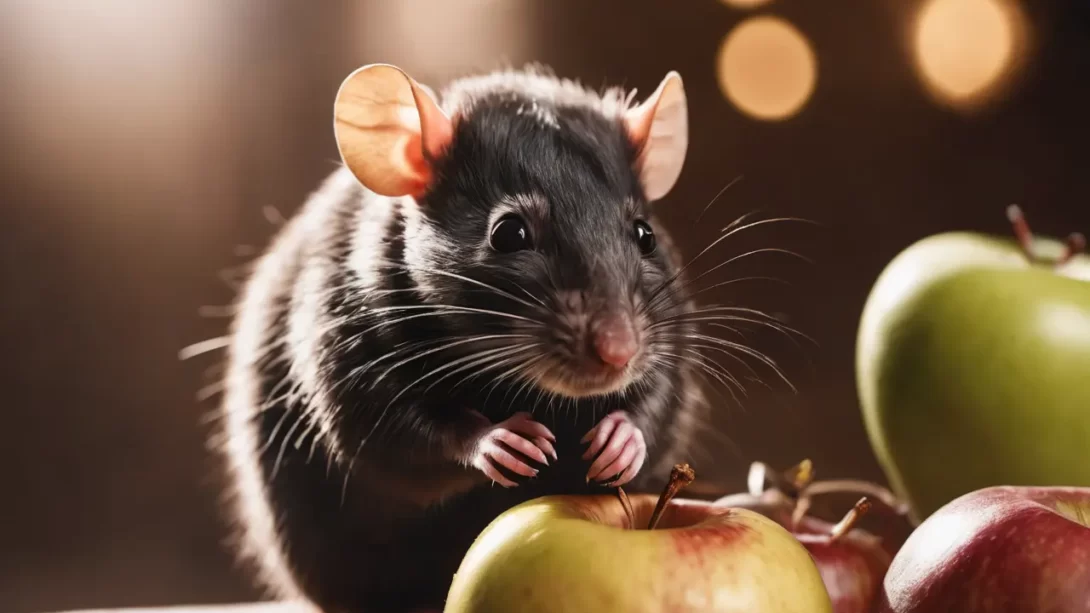Rats are known for their varied diet and curious appetite, making them interesting and engaging pets. As a rat owner, understanding what foods are safe and beneficial for your pet is crucial for their health and well-being. A common question among rat enthusiasts is whether apples are a suitable snack for their furry friends. This article aims to explore the benefits and potential risks of feeding apples to rats, offering guidance on how to include this fruit in their diet safely.
Nutritional Benefits of Apples for Rats
Apples are a nutritious fruit that can offer several health benefits to rats. They are a good source of vitamins, including Vitamin C, which is essential for preventing scurvy, a condition rats are prone to. Apples also provide dietary fiber, which aids in digestion, and a range of antioxidants that can support overall health. Additionally, their natural sweetness makes them an appealing treat for rats, who often enjoy varied flavors in their diet.
Potential Risks and Precautions
While apples can be a healthy addition to a rat’s diet, there are some risks and precautions to be aware of. The seeds of apples contain amygdalin, a compound that can release cyanide when chewed and digested, which is toxic to rats. Therefore, it is critical to remove all seeds before offering apple pieces to your rat. Moreover, due to their high sugar content, apples should be given in moderation to prevent obesity and related health issues.
How to Safely Include Apples in a Rat’s Diet
Incorporating apples into your rat’s diet can be done safely with a few simple steps. First, always wash the apple thoroughly to remove any pesticides or chemicals on the skin. Next, remove the core and seeds, as these can be harmful. Cut the apple into small, manageable pieces to prevent choking hazards. Apples can be offered fresh or as an occasional dried treat. However, it’s important to remember that dried apples are more concentrated in sugars, so they should be given sparingly. As a general guideline, apples should be a treat rather than a staple, making up only a small portion of your rat’s overall diet.
Other Safe Fruits for Rats
Rats can enjoy a variety of other fruits as part of a balanced diet. Safe options include bananas, blueberries, melons, and pears. These fruits are not only safe but also provide essential nutrients and variety to your rat’s diet. As with apples, it’s important to serve these fruits in moderation due to their natural sugar content. Always wash the fruits thoroughly, remove any seeds or pits, and cut them into small, manageable pieces. Introducing new fruits slowly into their diet is advisable to monitor for any adverse reactions.
Foods to Avoid in a Rat’s Diet
While many fruits are safe for rats, there are certain foods that should be avoided. Foods high in fat, sugar, or artificial additives can be harmful to rats. Specifically, avoid feeding chocolate, caffeinated beverages, candy, and overly processed foods. Some fruits and vegetables, like citrus fruits and onions, can also be harmful and should be avoided. It’s crucial to research and understand which foods are safe and which are potentially dangerous to maintain the health and well-being of your pet rat.
Conclusion
Feeding apples to rats can be a healthy and enjoyable treat when done correctly. The key is moderation and proper preparation. Remember to remove the seeds and core, serve in small portions, and integrate apples as part of a varied diet. This approach ensures that your rat can enjoy the nutritional benefits of apples without the risks.
The dietary health of your rat is not just about avoiding harmful foods, but also about providing a balanced mix of safe, nutritious options. Incorporating a variety of fruits like apples, along with a base diet of high-quality rat pellets and occasional vegetables, contributes to a well-rounded nutritional regimen. This diversity not only caters to their physical health but also to their need for mental stimulation and taste exploration.
In summary, while apples and other fruits are a safe and enjoyable addition to your rat’s diet, they should be complemented with other healthy foods. Always be mindful of the quantity and frequency of these treats. If you ever have concerns or questions about your rat’s diet, consulting with a veterinarian knowledgeable in small pets can provide you with tailored advice.
By understanding and adhering to these dietary guidelines, you can help ensure your pet rat enjoys a healthy, happy life. A well-fed rat is more likely to be active, inquisitive, and engaged, making your time with your furry friend all the more enjoyable.



